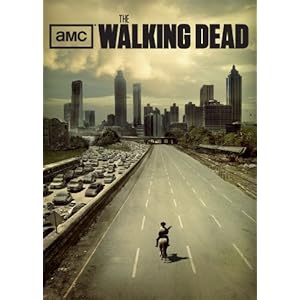
What is with our culture's fixation with these unflattering monstrosities? I don't completely understand the appeal behind these creatures, or at least I have my weak theories that I think may explain their appeal. As an outsider to the genre, I'll be trying to understand this genre throughout the month by watching the most popular zombie films and reading some of the recent books that include these supposed gruesome, unintelligible creatures.
Short History of the Unprecedented Evolution of the Psychological Intrigue of Monsters:
Curiously, all the famed fictitious monsters that originate from the Middle Ages, or perhaps even earlier, have gone through profound transformations. Vampires and werewolves both started in their literary primacy as remorseless, degenerative creatures that lack the intelligence/humanity, making them effective killing machines. They don't have the psychological ability to process these things. Vampires and werewolves were for a time the nightmarish vision of ourselves without the human elements that help us to transcend our primal mode of thought, and strive to be rational. Now, humanity still hides this sinister "vampire, werewolf," part of themselves in their subconscious. While Edgar Allen Poe did not overtly write about any of these creatures, he was the first to truly strip away the metaphorical dressing for these creatures. These monsters have always represented that part of ourselves, like many of Edgar Allen Poe's characters, that can completely dissociate itself with our all strict laws of decency (like either legal codes or religions) to help divide us from this "dark self." Hasn't the horror genre been less about literal monsters chasing us, and more specifically about our own internal struggle with two parts of our mind? Before psychology shed light on these concepts: the vampires, werewolves, and Poe's sociopaths mirror our internalized fear of the potential for our essential moral selves to vanish altogether and for us to unthinkably have our more primitive minds focused only on violence to completely dominate us.
Ever since Anne Rice, or even "Dark Shadows," before Anne Rice's seminal work, Interview with the Vampire, vampires have begun to go through a sharp transformation. Before this, the creature, Frankenstein or even the seemingly dissolute, Mr. Rochester from Jane Eyre, have begun to shed light on what we might be inaccurately calling "creatures," who share the same complicated brain chemistry that have long been denied to these fictitious monsters/villians. Before, the creatures were mostly just our primitive selves completely divided from us Jekyll and Hyde-style. Then again, "Hyde" is also an intrinsic part of Jekyll, though Jekyll fretfully wishes never to admit it. I guess I can safely say that Jekyll and Hyde, and even Edgar Allen Poe were the first writers to implicitly bring the monsters in closer association with ourselves. For too long, the monster stories of the past have to have a sharp separation from these creatures to insist to augment the important Christian ideal that human beings, through Jesus' resurrection have suddenly eradicated that part of themselves. Things get a little muddled when various denominations have never truly agreed on whether or not our "reptilian" or dark self has been completely extricated from our psyches. Perhaps, that is why some later groups in Christianity (not every single one, Christianity isn't monolithic) has become a little more neurotic and obsessed with the idea of having unwavering belief, as if to ward away the evil side. Isn't that why one of my favorite nineteenth century American writers,Nathaniel Hawthorne who wrote dozens of dark, horror tales about Puritans, show that the greatest sin was hubris that made people feel ascendant, and better than others just because they supposedly eliminated the dark, depraved part of ourselves. When in actuality, the very act of never acknowledging that it is intrinsic to us normally just leads to "madness" as evidenced in Poe's The Cask of Amontillado and of course, one of the prototypical illustrations of this psychological tension: Jekyll and Hyde.
Why do zombies go against this humanist progression about the "monster" within ourselves?
Is the zombie regressing the transition of monsters from the the humanistic sophistication of Anne Rice's vampires? Or has the zombie always just been the nostalgic representation of those bygone archetypes of the monsters being unquestionably evil in a Medieval framework of morality, where morals are easily separated into "good" or "bad" all inspired by Judeo-Christian concepts. Or, are they perhaps part of a newer trend of nihilism? Why do zombie movies seem to rely on keeping with the idea of making the monsters perpetually dull and easy for people to kill them without remorse?
Before, I used to rely on this baseless assumption that zombie films were inherently uninteresting just because they aren't scary...Is this really scary, does it send chills down our spine, or do they just lend to easy targets for B-rated action films that have eschewed all our known ideas of the moral complexity of human life?

Beware, this might sound like another generalization about a genre that I might be misunderstanding...But, why is it that zombies are mostly popular with a male audience. Do some guys, who desire mindless action films,feel frustrated with the new breed of complicated vampires/werewolves that might perhaps prevent them from having an easy target for safe primal war, without any binding moral laws? Its interesting that even some branches of fundamentalist religions has become victims to this same kind of machismo influence? How many children sing "We are in the Lord's army," and "The Battle Hymn of the Republic" to reflect on the idea that Jesus is only a military commander viewing all the remaining unsaved whole as worthy of annihilation?
At the same time, I don't think its logical to assume that zombies are a regression, or fitting with the fundamentalist Christian idea of Christians having militaristic opposition to the unwashed secular culture. On a broader scale, superseding our religious groups and ideologies, the fantasy of easy violence relates to this instinct in ourselves to have no moral restraint. Every religion has its violent apocalyptic fantasy that ushers in unalterable moral chaos. Isn't Revelations the "Dawn of the Dead" in the Bible? Then again, I think "Dawn of the Dead," is probably more coherent.. I still haven't watched it just yet.
Interestingly, Zombies are indiscriminately developed, and they don't seem to follow this ancient formula, only because Satan and Grendel were at least arguably crafty, plus there's a distinction made that these malevolent figures made the conscious choice to become bad. Zombies are victims of a whole other order.
This is why I am not keeping with the theory of them being "regressive" creatures, but they still have followed a whole different track than their vampire/werewolf brothers and sisters. They just do not seem to be creatures of intrigue.
Could zombies perhaps be illustrative of the apathy/nihilism of current culture? Has our increased intelligence of the complexities of moral issues have paradoxically lead to losing a sense of significant purpose? What if zombies are showing the fear of the universe being "amoral?"
*I'll discuss more of these issues in-depth next time, and I know I've been making some strange generalizations throughout this article. I am not bashing the zombie genre, but seeking understanding behind its magnetism. I really do like a few zombie books/ movies, so I know there's much more to them then whatever I place here*
Possible Future Zombie Books/ Movies/TV Shows to Cover:















No comments:
Post a Comment